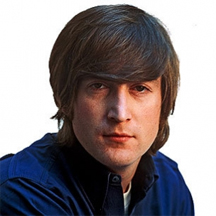John Lennon (9 October 1940 – 8 December 1980), was an English musician, singer and songwriter who rose to worldwide fame as a founder member of the rock band the Beatles, the most commercially successful band in the history of popular music. With Paul McCartney, he formed a songwriting partnership that is one of the most celebrated of the 20th century. When the group disbanded in 1970, Lennon embarked on a solo career that produced iconic songs such as “Imagine”, “Give Peace a Chance” and “Working Class Hero”. After disengaging himself from the music business in 1975 to raise his infant son Sean, he re-emerged with Yoko Ono in 1980 with the new album Double Fantasy. He was murdered three weeks after its release. He was posthumously inducted into the Songwriters Hall of Fame in 1987 and into the Rock and Roll Hall of Fame twice; as a member of the Beatles in 1988 and as a solo artist in 1994. (More from Wikipedia)
By now, the parade of early deaths of beloved musicians is long indeed; I remember being affected by the senseless assassination of John Lennon on December 8, 1980 nearly as much as that of President John F. Kennedy on November 22, 1963.
* * *
The impact of this one Elvis recording can hardly be overstated. “Heartbreak Hotel” was one of the biggest influences on John Lennon that inexorably led to the formation of the Beatles. In a quote given in Wikipedia, John Lennon speaks of his feelings about the song: “When I first heard ‘Heartbreak Hotel’, I could hardly make out what was being said. It was just the experience of hearing it and having my hair stand on end. We’d never heard American voices singing like that. They always sung like [Frank] Sinatra or enunciate very well. Suddenly, there’s this hillbilly hiccuping on tape echo and all this bluesy stuff going on. And we didn’t know what Elvis was singing about. . . . It took us a long time to work out what was going on. To us, it just sounded like a noise that was great.”
John Lennon is not the only British rock legend who was similarly affected by “Heartbreak Hotel”. George Harrison was only 13 and riding his bike past a friend’s house when he overheard the song being played in 1956; he said the song gave him a “rock and roll epiphany”. The following year, Harrison auditioned to be the guitarist for John Lennon’s early band the Quarrymen.
* * *
John Lennon was even more blunt: “If you tried to give rock and roll another name, you might call it ‘Chuck Berry’.” Ted Nugent has said: “If you don’t know every Chuck Berry lick, you can’t play rock guitar.”
* * *
Both Paul McCartney and John Lennon have called Buddy Holly a primary influence on their work; Ian Whitcomb once said that “Buddy Holly and the Crickets had the most influence on the Beatles.” The Beatles did a lovely cover of “Words of Love” that was released in late 1964 on their album Beatles for Sale. During the recording sessions for the Let it Be album in January 1969, the Beatles recorded a slow version of “Mailman, Bring Me No More Blues” (a song popularized by Buddy Holly, though not written by him); the song was later released on Anthology 3. Also, John Lennon recorded a cover of “Peggy Sue” on his 1975 solo album Rock ’n’ Roll.
(June 2013/1)
* * *
Phil Spector’s work with the Beatles on their final album, Let it Be is more controversial, with many contending that it was more overproduction than production in that case. Ultimately, the album was re-released in 2003 without Spector’s production and overdubs under the name Let it Be . . . Naked. Still, Phil Spector worked with John Lennon on several of his solo albums.
* * *
The Beatles performed a sort of mini-Wall of Sound at the close of their masterful Sgt. Pepper’s Lonely Hearts Club Band album, not long after Phil Spector came along. Following the second symphonic build-up within “A Day in the Life”, the orchestra swelled into a crescendo, and then there was a thunderous piano chord (an E-major chord to be exact). Many people who have been around a piano marvel at how long the instrument can hold a note; and here, the Beatles were dealing that expectation up in spades with a long, slow fade for nearly one full minute before the sound faded into background hiss.
Actually though, it wasn’t just one piano: John Lennon, Paul McCartney, Ringo Starr, and one of the Beatles’ roadies, Mal Evans were manning different pianos; while George Martin was playing the same chord on a harmonium. What’s more, the gain was gradually turned up as the chord faded in order to prolong the effect – at the end (they tell me), it is possible to hear background sounds in the recording studio: rustling papers, a squeaking chair, and the air conditioners.
* * *
After a few albums of (more or less) pure country, Linda Ronstadt perfected her sound when she connected with one of the top producers of the 1970’s, Peter Asher; he was also Ronstadt’s manager for several years. Peter Asher and Gordon Waller performed as Peter and Gordon, a British duo who enjoyed several years of success, particularly with their #1 hit in 1964, “A World Without Love”. The song was written by Paul McCartney but credited as Lennon/McCartney as was all of his music and that of John Lennon in the British Invasion period.
(October 2013)
* * *
Among the eulogies written about Lou Reed are some that compare his contributions to rock and roll to those of Bob Dylan and John Lennon, and I can’t really argue with that assessment.
(December 2013)
* * *
I have previously written of The Sound of San Francisco and quoted nearly all of Mick Farren’s liner notes for that album; Boyskout is the first (though not the last) UARB to be drawn from the roster. My tribute to Mick Farren is coming up later this year; his death last year upset me as much as any I can think of from the music world since that of John Lennon.
(January 2014)
* * *
Mick Farren’s death last July affected me more than that of any musician since John Lennon back in 1980; he died a little shy of his 70th birthday, like three of my four grandparents.
(March 2014/1)
* * *
By contrast, the people at Gear Fab Records – one of the better reissue record companies – are quite enthusiastic about Homer; Galen Niles was brought in to write the liner notes for the 2012 CD, Homer. (The record company name comes from two Beatles-era expressions for “cool”; both are featured in the background singing on “All Those Years Ago”, the 1981 George Harrison song honoring recently assassinated John Lennon and also featuring the other two living Beatles in the band).
(April 2014)
* * *
Ringo Starr (real name: Richard Starkey, Jr.) was the final addition to the classic line-up when he was brought in as the band’s drummer, replacing Pete Best. He is the oldest of the Beatles (all of 23 when they hit the big time), having been born three months before John Lennon.
“Move It” was an original song by bandmember Ian “Sammy” Samwell and was first released as the “B” side, with the “A” side being a cover of a song by American artist Bobby Helms called “Schoolboy Crush”. “Move It” went to #2 on the UK charts in 1958 and is widely regarded as the first authentic British rock and roll song. John Lennon has been quoted as saying (from Wikipedia): “Before Cliff [Richard] and the Shadows, there had been nothing worth listening to in British music.” Cliff Richard is the third top-selling singles artist in British history, behind only the Beatles and Elvis Presley.
(November 2014)
* * *
The truly heartbreaking part of his Alzheimer’s diagnosis is that Glen Campbell had just launched a comeback a few years before, with his 2008 album Meet Glen Campbell that features Campbell covering songs by U2, Foo Fighters, Tom Petty, and Green Day – “Good Riddance (Time of Your Life)” being the latter song – plus one of the last songs written by John Lennon, “Grow Old with Me”, and an early Jackson Browne song, “These Days” that was first recorded by Nico in 1967.
(February 2015)
* * *
Their second single was actually a Lennon/McCartney song, “I Wanna Be Your Man”; from Wikipedia: “According to various accounts, either the Rolling Stones’ manager/producer Andrew Loog Oldham or the Rolling Stones themselves ran into [John] Lennon and [Paul] McCartney on the street as the two were returning from an awards luncheon. Hearing that the band were in need of material for a single, Lennon and McCartney went to their session at De Lane Lea Studio and finished off the song – whose verse they had already been working on – in the corner of the room while the impressed Rolling Stones watched.”
John Lennon believes that their experience with “I Wanna Be Your Man” was helpful in getting the songwriting team underway; as he related in the famous Playboy magazine interview in 1980 (a few months before his assassination): “We were taken down to meet them at the club where they were playing in Richmond by Brian [Epstein] and some other guy. They wanted a song and we went to see what kind of stuff they did. Mick [Jagger] and Keith [Richards] heard we had an unfinished song – Paul [McCartney] just had this bit and we needed another verse or something. We sort of played it roughly to them and they said, ‘Yeah, OK, that’s our style.’ But it was only really a lick, so Paul and I went off in the corner of the room and finished the song off while they were all still sitting there talking. We came back, and that’s how Mick and Keith got inspired to write . . . because, ‘Jesus, look at that. They just went in the corner and wrote it and came back!’ You know, right in front of their eyes we did it. So we gave it to them.”
(May 2015)
* * *
The October 1964 single by the Beatles, “I Feel Fine” (included on their album Beatles ’65) is credited as the first song to use feedback in a rock recording. The band was about to leave the recording studio when John Lennon left his guitar resting against his amplifier, only to be greeted by a whine of sound. A feedback note was then added to the very beginning of the song. In one of his last interviews, John Lennon spoke proudly of this musical innovation: “I defy anybody to find a record . . . unless it is some old blues record from 1922 . . . that uses feedback that way. So I claim it for the Beatles. Before [Jimi] Hendrix, before the Who, before anybody. The first feedback on record.”
* * *
Another fun effect is running the same or similar musical sections slightly out of sync; it is variously described as phasing and flanging. The latter term was reportedly coined by John Lennon and is still in use today; it refers to sound effects caused by the manual or accidental slowing down of tape in a take-up reel, though the effect can be created electronically as well. The Wikipedia article on flanging describes it this way: “As an audio effect, a listener hears a ‘drainpipe’ or ‘swoosh’ or ‘jet plane’ sweeping effect as shifting sum-and-difference harmonics are created analogous to use of a variable notch filter.” One of the earliest uses of phasing in rock music is the 1967 hit song by Small Faces, “Itchycoo Park”.
(July 2015)
* * *















